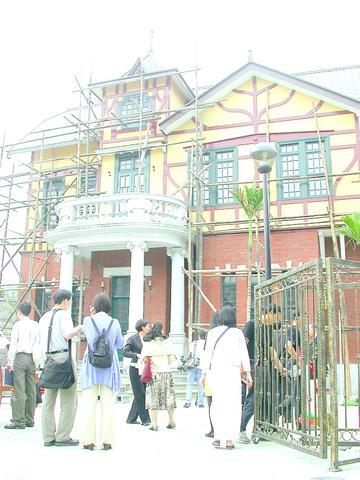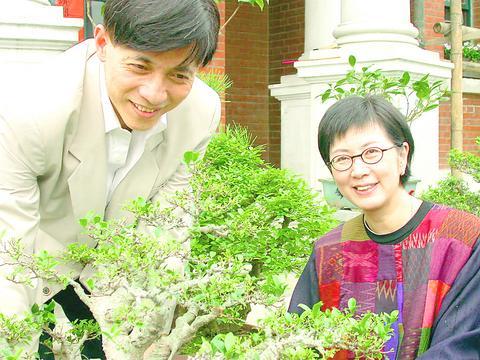People used to call the exotic house on Taipei's Chungshan North Road, just outside the Taipei Fine Arts Museum, the Yuanshan Villa. Now, after extensive renovation, it has been renamed the Taipei Story House, and is scheduled to open on April 19.
The building is joining a number of other heritage sites targeted by the Taipei Cultural Affairs Bureau -- the Chian Mu Residence (
One difference though -- Taipei Story House is the first of these sites in which the initiator of the project has been a private person.

PHOTO:VICO LEE, TAIPEI TIMES
Chen Kuo-tsi (陳國慈), chairwoman of the Female Cancer Foundation and a respected lawyer, won the contract to run the venue last year. Comparing the building to a grandpa with countless stories to tell, Chen named the villa Taipei Story House.
Over its 90-year history, the house has served many functions. According to a study published by the Taipei City Government, what is now called the Taipei Story House was built in 1914 as a private guest house for Chen Chao-chun (
After Chen's business collapsed in 1923, the occupying Japanese military's Execution Team took over the building to incarcerate prisoners.

PHOTO:VICO LEE, TAIPEI TIMES
Following Retrocession, it became the residence of legislative speaker, Huang Guo-shu (黃國書).
The Taipei City Government managed the place from 1979, when the Taipei Fine Arts Museum (TFAM) was being built.
Under TFAM's management, it first served as a Center for Artist Exchange (
When the city government classified it as a Class C heritage site in 1998, it was already so dilapidated that the Culture Affairs Bureau decided to give it a thorough face-lift, a process that took five years.
Details on the early history of the building are sketchy. "So few documents about the house have survived to give a precise history, so it remains somewhat mysterious," said Chen.
"The word `story' means `things of the past' in Chinese, so that the Story House is meant to be a place where people can reminisce about the past," Chen said.
Taipei's history will be the theme of seasonal events at this location, which, soon after it opens on April 19, will also play host to a series of seminars on the preservation of cultural heritage and a painting competition themed on historical buildings.
To pay tribute to the house's origin as a tea trader's villa, tea culture will also be a regular theme for seminars and exhibitions.
To help people recall the past, Chen and her team have scheduled screenings of silent movies in the audio-visual room. Some of the films, from France, the US and Taiwan, will be about historical figures. A small gallery of "living art" will provide artists working in pottery, glass, leather or other materials a location to display and sell their work. Visitors will be able to relax in an outdoor garden restaurant, which surrounds the building.
All this, Chen said, will have cost her NT$35 million over the next four years, but Chen considers it worth the money. "Not everyone has the time and the personal resources to do such things. I was lucky to know people who can help me in this. If my move encourages others to adopt historical buildings, then it's worthwhile," Chen said.
Chen was born in Hong Kong and spent her formative years there, but 20 years ago she adopted Taiwan as her home. "I have a strong sense of belonging in Taipei," Chen said.
Hong Kong's colonial atmosphere did not appeal to Chen, who practiced law in New York before migrating to Taiwan in 1986. "Taiwan represents for me the only free land of the Chinese people," she said.
Passing the villa every day, Chen feels a sense of attachment. The building is also special architecturally, for the British inspired building stands out against the more numerous buildings of the Japanese colonial period, such as the Presidential Building and Chungshan Hall.
"When I first saw the building, I felt a kinship, perhaps because I studied in England," Chen said.
Chen's enthusiasm for cultural activities partly stems from her three-year term as the first Chief Executive of the National Culture and Arts Foundation (國家文化藝術基金會), which offers arts awards and provides grants for artists.
"Arts and cultural workers work very hard and in very difficult conditions. I came to sympathize with them and agree with their ideals. Although the foundation gave them subsidies, they helped improve the quality of life for the general public, which is more important," said Chen, who hopes the Story House will help cultural workers in their future endeavors.
After helping the Foundation get on its feet, Chen took the position of chief of legal affairs at Taiwan Semiconductor Manufacturing Company Foundation (
"I was in charge of the distribution of funds for arts and culture. Although some people regard subsidizing cultural activities as charity, I think it's our duty, because the money you give to art groups eventually goes into the improvement of our quality of our life, and therefore we are the real beneficiary."
During her stint at TSMC, Chen contributed to the reopening of Taipei Film House, another recently renovated building in Taipei, a project in to which TSMC contributed NT$60 million.
The private sector and individuals should make more of an effort to make our cultural heritage an active part of people's lives, Chen said. "Waiting passively for the government to liven up heritage buildings is not enough. We can make efforts ourselves so that old houses do not just become homes for mosquitoes," Chen said.

May 18 to May 24 Pastor Yang Hsu’s (楊煦) congregation was shocked upon seeing the land he chose to build his orphanage. It was surrounded by mountains on three sides, and the only way to access it was to cross a river by foot. The soil was poor due to runoff, and large rocks strewn across the plot prevented much from growing. In addition, there was no running water or electricity. But it was all Yang could afford. He and his Indigenous Atayal wife Lin Feng-ying (林鳳英) had already been caring for 24 orphans in their home, and they were in

On May 2, Chinese Nationalist Party (KMT) Chairman Eric Chu (朱立倫), at a meeting in support of Taipei city councilors at party headquarters, compared President William Lai (賴清德) to Hitler. Chu claimed that unlike any other democracy worldwide in history, no other leader was rooting out opposing parties like Lai and the Democratic Progressive Party (DPP). That his statements are wildly inaccurate was not the point. It was a rallying cry, not a history lesson. This was intentional to provoke the international diplomatic community into a response, which was promptly provided. Both the German and Israeli offices issued statements on Facebook

Even by the standards of Ukraine’s International Legion, which comprises volunteers from over 55 countries, Han has an unusual backstory. Born in Taichung, he grew up in Costa Rica — then one of Taiwan’s diplomatic allies — where a relative worked for the embassy. After attending an American international high school in San Jose, Costa Rica’s capital, Han — who prefers to use only his given name for OPSEC (operations security) reasons — moved to the US in his teens. He attended Penn State University before returning to Taiwan to work in the semiconductor industry in Kaohsiung, where he

President William Lai (賴清德) yesterday delivered an address marking the first anniversary of his presidency. In the speech, Lai affirmed Taiwan’s global role in technology, trade and security. He announced economic and national security initiatives, and emphasized democratic values and cross-party cooperation. The following is the full text of his speech: Yesterday, outside of Beida Elementary School in New Taipei City’s Sanxia District (三峽), there was a major traffic accident that, sadly, claimed several lives and resulted in multiple injuries. The Executive Yuan immediately formed a task force, and last night I personally visited the victims in hospital. Central government agencies and the